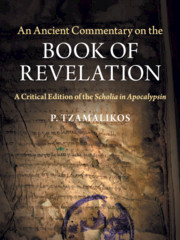Book contents
- Frontmatter
- Contents
- Preface
- Exordium
- Abbreviations
- Introduction
- Part I Text of Revelation and Scholia in Apocalypsin
- Part II Expanded Notes to the Scholia
- Expanded Notes to Scholion I
- Expanded Notes to Scholion II
- Expanded Notes to Scholion III
- Expanded Notes to Scholion IV
- Expanded Notes to Scholion V
- Expanded Notes to Scholion VI
- Expanded Notes to Scholion VII
- Expanded Notes to Scholion VIII
- Expanded Notes to Scholion IX
- Expanded Notes to Scholion X
- Expanded Notes To Scholion XI
- Expanded Notes to Scholion XII
- Expanded Notes to Scholion XIII
- Expanded Notes to Scholion XIV
- Expanded Notes to Scholion XV
- Expanded Notes to Scholion XVI
- Expanded Notes to Scholion XVII
- Expanded Notes to Scholion XVIII
- Expanded Notes to Scholion XIX
- Expanded Notes to Scholion XX
- Expanded Notes to Scholion XXI
- Expanded Notes to Scholion XXII
- Expanded Notes to Scholion XXIII
- Expanded Notes to Scholion XXIV
- Expanded Notes to Adnotatio Post Scholion XXIV
- Expanded Notes to Scholion XXV
- Expanded Notes to Scholion XXVI
- Expanded Notes to Scholion XXVII
- Expanded Notes to Scholion XXVIII
- Expanded Notes to Scholion XXIX
- Expanded Notes to Scholion XXX
- Expanded Notes to Scholion XXXI
- Expanded Notes to Scholion XXXII
- Expanded Notes to Scholion XXXIII
- Expanded Notes to Scholion XXXIV
- Expanded Notes to Scholion XXXV
- Expanded Notes to Scholion XXXVI
- Expanded Notes to Scholion XXXVII
- Expanded Notes to Scholion XXXVIII
- Expanded Notes to Scholion XXXIX
- Bibliography
- Index of authors cited in the scholia
- Index of Names in the Scholia
- Index of terms in the scholia
- Biblical citations in the scholia
- Index of modern authors
- General index
- References
Expanded Notes to Scholion XXVII
from Part II - Expanded Notes to the Scholia
Published online by Cambridge University Press: 05 August 2014
- Frontmatter
- Contents
- Preface
- Exordium
- Abbreviations
- Introduction
- Part I Text of Revelation and Scholia in Apocalypsin
- Part II Expanded Notes to the Scholia
- Expanded Notes to Scholion I
- Expanded Notes to Scholion II
- Expanded Notes to Scholion III
- Expanded Notes to Scholion IV
- Expanded Notes to Scholion V
- Expanded Notes to Scholion VI
- Expanded Notes to Scholion VII
- Expanded Notes to Scholion VIII
- Expanded Notes to Scholion IX
- Expanded Notes to Scholion X
- Expanded Notes To Scholion XI
- Expanded Notes to Scholion XII
- Expanded Notes to Scholion XIII
- Expanded Notes to Scholion XIV
- Expanded Notes to Scholion XV
- Expanded Notes to Scholion XVI
- Expanded Notes to Scholion XVII
- Expanded Notes to Scholion XVIII
- Expanded Notes to Scholion XIX
- Expanded Notes to Scholion XX
- Expanded Notes to Scholion XXI
- Expanded Notes to Scholion XXII
- Expanded Notes to Scholion XXIII
- Expanded Notes to Scholion XXIV
- Expanded Notes to Adnotatio Post Scholion XXIV
- Expanded Notes to Scholion XXV
- Expanded Notes to Scholion XXVI
- Expanded Notes to Scholion XXVII
- Expanded Notes to Scholion XXVIII
- Expanded Notes to Scholion XXIX
- Expanded Notes to Scholion XXX
- Expanded Notes to Scholion XXXI
- Expanded Notes to Scholion XXXII
- Expanded Notes to Scholion XXXIII
- Expanded Notes to Scholion XXXIV
- Expanded Notes to Scholion XXXV
- Expanded Notes to Scholion XXXVI
- Expanded Notes to Scholion XXXVII
- Expanded Notes to Scholion XXXVIII
- Expanded Notes to Scholion XXXIX
- Bibliography
- Index of authors cited in the scholia
- Index of Names in the Scholia
- Index of terms in the scholia
- Biblical citations in the scholia
- Index of modern authors
- General index
- References
Summary
EN XXVIIa: ὁ πᾶς λόγος τῆς προνοίας (‘the entire teaching about providence’)
The idea that ‘providence’ (πρόνοια) is the force responsible for the ‘government’ (διοίκησις) of the world is a Christian borrowing from Stoicism, which was treated by Origen, Gregory of Nazianzus, and Didymus. This is also used in the Pseudo-Clementine writings. At a particular point where the ‘teaching about providence’ is discussed, one should notice that Didymus appears to copy Eusebius commenting on Psalm 103:13. In fact, however, this is actually an ascription to Didymus by later catenists. By the same token, both the idea and vocabulary occur in passages ascribed to Origen, yet the abundance of references is perhaps partially due to those (Didymus, Evagrius) who inserted a specific formulations into excerpts from his work.
EN XXVIIb: ἡδέα καὶ ἀηδῆ (‘things either pleasant or unpleasant’)
The formula originates in Hellenistic literature. The first-century BC Alexandrian grammarian Philoxenus refers to the ancients who made a distinction between ἡδέα καὶ τερπνά, which are things ‘pleasant’ and ‘warm’ (ἀπὸ τῶν θερμῶν), distinguished from those that are ἀηδῆ καὶ λυπηρά (‘cool’ and ‘depressing’, ἀπὸ τῶν ψυχρῶν). Galen classified all things that fall within the scope of the five senses into ἡδέα and ἀηδῆ, as Alexander of Aphrodisias also did. Sextus Empiricus employed the same distinction, too.
- Type
- Chapter
- Information
- An Ancient Commentary on the Book of RevelationA Critical Edition of the Scholia in Apocalypsin, pp. 320 - 328Publisher: Cambridge University PressPrint publication year: 2013



